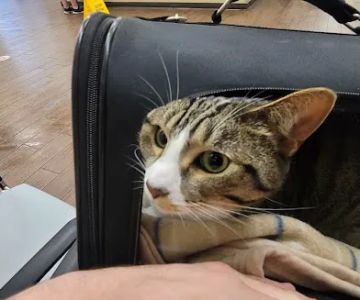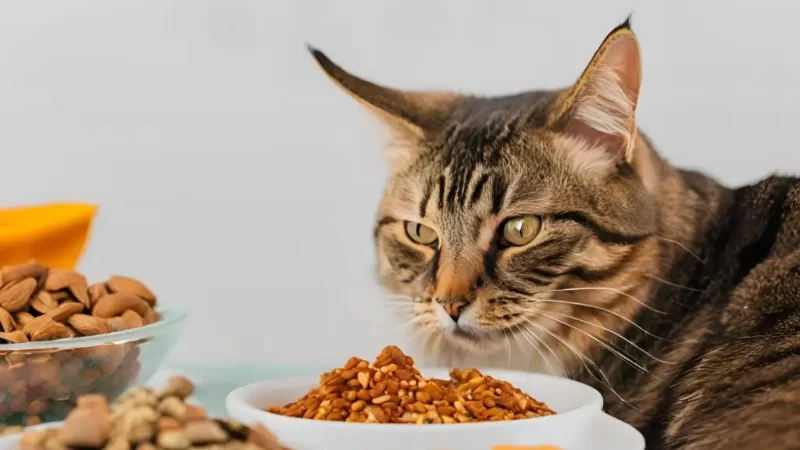- 1. Introduction: Why Your Cat May Be Eating Less and Losing Weight
- 2. Possible Causes of Weight Loss and Reduced Appetite in Cats
- 3. How to Diagnose the Underlying Issue
- 4. Treatment Options for Cats Eating Less and Losing Weight
- 5. When to See a Veterinarian
- 6. How to Prevent Weight Loss in Cats
- 7. How Hidden Brook Veterinary Can Help Your Cat Stay Healthy
1. Introduction: Why Your Cat May Be Eating Less and Losing Weight
As pet owners, it’s important to keep an eye on your cat’s eating habits and weight. If you notice your cat eating less and losing weight, it can be a sign of an underlying health issue. Cats are known for their independent nature, but a change in eating habits or weight loss should never be ignored. Understanding the possible causes and seeking timely solutions is key to ensuring your cat’s well-being. In this article, we’ll explore the common reasons for weight loss in cats, how to diagnose the issue, and the steps you can take to help your feline friend regain their health.

468 Cassat Ave, Jacksonville, FL 32254, USA
See Details2. Possible Causes of Weight Loss and Reduced Appetite in Cats
There are several potential reasons why a cat might eat less and lose weight. Some causes may be more serious than others, so it’s essential to monitor your cat’s behavior closely. Here are some of the most common causes:
2.1 Dental Problems
One of the first things to consider is dental issues. Cats can experience pain from dental disease, such as gingivitis or periodontal disease, which can make eating uncomfortable. If your cat is having difficulty chewing, they may eat less, leading to weight loss. Look for signs like drooling, pawing at the mouth, or bad breath.
2.2 Illness or Infection
Various illnesses or infections can cause a cat to lose its appetite and weight. Conditions such as kidney disease, hyperthyroidism, diabetes, or gastrointestinal issues are often accompanied by weight loss. If your cat also shows symptoms like vomiting, diarrhea, lethargy, or increased thirst, it may be a sign of a serious health problem.
2.3 Stress or Anxiety
Stress and anxiety can also cause cats to eat less. Changes in their environment, such as a new pet, moving to a new home, or changes in routine, can lead to emotional stress. Cats are creatures of habit, and disruptions to their environment can result in a reduced appetite and weight loss. If your cat’s stress levels are high, consider ways to provide a calmer and more stable environment.
2.4 Aging
As cats age, their metabolism may slow down, leading to weight loss. Older cats may also develop medical conditions such as arthritis or dental problems, which can affect their eating habits. It’s important to monitor your senior cat closely and provide them with a balanced diet that supports their aging body.
3. How to Diagnose the Underlying Issue
If your cat is eating less and losing weight, it’s important to take them to the vet for a thorough diagnosis. Here’s how the diagnosis process typically works:
3.1 Physical Examination
Your veterinarian will begin with a physical examination to check for any obvious signs of illness, such as fever, pain, or abnormal growths. They may also examine your cat’s mouth and teeth to rule out dental issues.
3.2 Blood Tests and Urinalysis
To identify internal health issues, your vet may recommend blood tests and a urinalysis. These tests can help diagnose conditions such as kidney disease, diabetes, or thyroid problems. Blood tests can also help determine if there are any infections or imbalances affecting your cat’s health.
3.3 Imaging Tests
If necessary, your veterinarian may recommend imaging tests like X-rays or ultrasounds to get a better view of your cat’s internal organs. These tests can help identify any tumors, digestive issues, or other conditions that may be causing weight loss.
4. Treatment Options for Cats Eating Less and Losing Weight
The treatment for a cat eating less and losing weight depends on the underlying cause. Once your vet has diagnosed the issue, they can recommend the appropriate treatment plan:
4.1 Treating Dental Issues
If dental disease is the cause, your vet may recommend a dental cleaning or even tooth extraction to relieve pain and make eating easier for your cat. Ensuring your cat’s teeth are healthy can make a significant difference in their appetite and overall well-being.
4.2 Medications
If your cat has a medical condition like diabetes or hyperthyroidism, your vet may prescribe medication to manage the condition. For example, insulin is used to treat diabetes, while medications to regulate thyroid levels are prescribed for hyperthyroidism. Medication can help restore your cat’s normal appetite and weight.
4.3 Appetite Stimulants
In some cases, your vet may prescribe appetite stimulants to encourage your cat to eat. These medications are typically used for cats that are recovering from illness or surgery and need a little extra help getting their appetite back.
4.4 Dietary Adjustments
Sometimes, the solution is as simple as changing your cat’s diet. Your vet may recommend a high-calorie, easy-to-digest food that encourages your cat to eat more. For cats with aging issues, specialized senior cat food may be recommended to support their changing nutritional needs.
5. When to See a Veterinarian
If your cat is eating less and losing weight, it’s important to seek veterinary care as soon as possible. Delaying treatment can lead to further health complications and worsen the underlying issue. If your cat is also showing other concerning symptoms, such as vomiting, diarrhea, lethargy, or changes in behavior, it’s even more urgent to consult a veterinarian.
6. How to Prevent Weight Loss in Cats
Preventing weight loss in cats involves regular monitoring of their health and well-being. Here are some tips to help keep your cat healthy and avoid weight loss:
6.1 Regular Vet Check-ups
Annual veterinary check-ups are essential to catch potential health issues early. Your vet can provide advice on diet, exercise, and overall care to maintain your cat’s health and weight.
6.2 Balanced Diet
Make sure your cat is eating a balanced, nutritious diet that suits their age, health, and activity level. Discuss your cat’s dietary needs with your veterinarian to choose the best food for their specific needs.
6.3 Stress Management
If your cat is prone to stress or anxiety, consider ways to minimize environmental stressors. Provide a stable routine, quiet spaces, and plenty of stimulation to help your cat feel comfortable and secure in their environment.
7. How Hidden Brook Veterinary Can Help Your Cat Stay Healthy
At Hidden Brook Veterinary, we specialize in caring for your cat’s health and well-being. Our experienced team is here to help you address concerns like eating less and weight loss, offering thorough diagnostic services and tailored treatment plans. Whether your cat is facing dental issues, illness, or dietary concerns, we’re here to help them live a healthy, happy life.
Visit Hidden Brook Veterinary today to schedule an appointment and get the best care for your feline friend!











